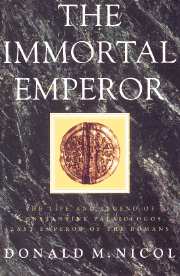Book contents
7 - THE DYING EMBERS
Published online by Cambridge University Press: 28 October 2009
Summary
The founder of the dynasty of Palaiologos, the Emperor Michael VIII, had died condemned as a heretic and a traitor by his church and people because he had bullied them into communion with the church of Rome. They had denied him the funeral pomps of an Orthodox Emperor. His descendant Constantine Palaiologos, whatever the true circumstances of his death, died as a hero in the eyes of the Orthodox church. Yet there is no evidence that he ever repudiated the union of Florence. He too died in communion with the church of Rome, a catholicus zelator as a German poet of the fifteenth century described him. Many had accused him of heresy and betrayal of his faith while he was alive. His death sanctified him. The Patriarch Gennadios held his peace. He would surely never have countenanced the Emperor's canonisation; and there was no question of giving him a Christian burial. But his former subjects, the Orthodox Christians, honoured Constantine as a martyr. They forgot or ignored the fact that he had died in heresy; and, as the sleeping Emperor petrified in marble and waiting for his time to come, he became the invisible symbol of the still living faith of Orthodoxy. Stories were told of the priest who would one day return to complete the Liturgy in St Sophia which had been so savagely interrupted on the morning of 29 May 1453. He had disappeared into a wall of the church. He too was not dead but sleeping, waiting for his hour to come.
- Type
- Chapter
- Information
- The Immortal EmperorThe Life and Legend of Constantine Palaiologos, Last Emperor of the Romans, pp. 109 - 128Publisher: Cambridge University PressPrint publication year: 1992



